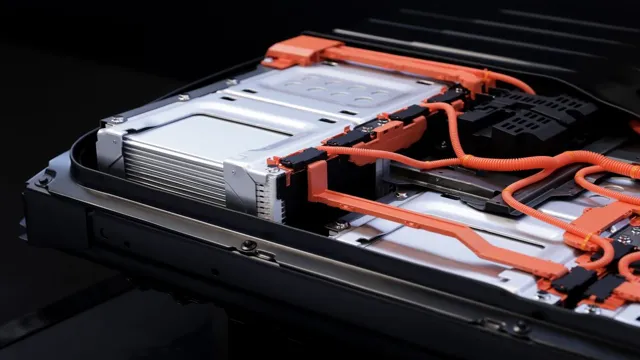Uncovering the True Cost of Powering Your Ride: Exploring the Average Battery Cost for Electric Cars
Electric car battery costs are a hot topic these days as more and more people are considering transitioning to electric vehicles. While electric vehicles offer numerous advantages, such as being environmentally-friendly and cost-effective in the long run, the initial sticker price can be a deterrent for many. This is primarily because of the battery costs associated with electric cars, which can make up a significant portion of the overall cost.
But how much do electric car batteries cost, and what factors affect their price? In this blog, we’ll dive into the world of electric car battery costs, exploring everything you need to know before making the switch to an electric vehicle.
Current Industry Average
According to recent industry studies, the average battery cost for electric cars has been steadily decreasing in recent years. The current average battery cost for an electric vehicle is around $137 per kilowatt-hour (kWh). However, this figure can vary depending on numerous factors such as the type of battery, the vehicle’s range, and the manufacturer’s production capabilities.
Additionally, the cost of batteries is expected to continue to decline in the coming years due to increased production and advancements in technology. This is good news for consumers as it means that electric cars will become more affordable and accessible in the near future. With the decreasing cost of batteries, coupled with government incentives and the growing number of charging stations, it is no wonder that more and more people are considering switching to electric vehicles.
Data on Battery Costs by Manufacturer
Battery costs are a crucial factor for manufacturers as they strive to provide affordable and high-performing products to consumers. The current industry average for battery costs varies across different manufacturers. Tesla is known to have lower battery costs due to their vertical integration and economies of scale, making them one of the most efficient producers in the industry.
Other manufacturers like General Motors and Volkswagen have also been working to reduce costs, as they aim to compete with Tesla and other players in the electric vehicle market. However, it’s important to note that battery costs are just one part of the overall price of an electric vehicle, with other factors like production and marketing expenses also playing a role. As the demand for electric vehicles continues to grow, it will be interesting to see how the industry average for battery costs evolves and adapts.
Factors Affecting Battery Cost
Battery cost is an important factor that plays a crucial role in determining the adoption of electric vehicles (EVs). Currently, the industry average for battery cost is around $137 per kilowatt-hour (kWh), but certain factors contribute to this cost. One of the biggest factors is the cost of raw materials used to manufacture batteries, such as lithium-ion cells.
The demand for these materials has increased exponentially as EVs gain more popularity, causing a surge in prices. Another factor is the cost of research and development to improve battery technology, increase efficiency and reduce the weight of batteries. Additionally, the cost of battery manufacturing and assembly also contributes to the total cost.
However, with economies of scale, these costs are expected to decrease as production increases, making EVs more affordable for the masses.
Cost-Saving Options
If you’re considering switching to an electric car, one of the most important things to keep in mind is the cost of battery replacement. On average, the cost of replacing a battery in an electric car ranges from $3,000 to $7,000, depending on the make and model of the car. However, there are a few cost-saving options that you can explore if you’re on a budget.
One option is to lease the battery instead of buying it outright. Many electric car manufacturers offer this option, which can lower the upfront cost of the car and spread the cost of the battery replacement over time. Another option is to purchase a used electric car with a battery that still has some life left in it.
While this may require some research and patience, it can be a great way to get a good deal on an electric car. Ultimately, it’s important to do your research and weigh your options carefully before making a decision.
Leasing vs. Buying Batteries
When it comes to the decision of leasing vs. buying batteries, cost-saving options should be a key consideration. Leasing batteries for your electric vehicle can seem like a more affordable option since you don’t have to pay the full cost upfront.
Typically, leasing companies will charge a monthly fee for renting the battery, and this can be lower than the cost of buying a battery outright. However, it’s important to keep in mind that the overall cost can add up over time due to interest rates and other fees. On the other hand, buying a battery upfront may be more costly initially, but you’ll avoid monthly fees and interest rates in the long run.
Ultimately, your decision should depend on your financial circumstances, driving habits, and the specific terms of the leasing or buying agreement. It’s worthwhile to do your own calculations and comparisons to determine which option is the most cost-effective for you in the long term.
Government Incentives and Rebates
When it comes to upgrading your home’s energy efficiency, it’s important to consider all cost-saving options available to you. One such option is taking advantage of government incentives and rebates. Many local and state governments offer programs that allow homeowners to receive financial assistance for energy-efficient upgrades, such as solar panel installation or upgrading to Energy Star-rated appliances.
These incentives can significantly offset the initial investment, making it more accessible for homeowners looking to make a positive impact on their energy usage and lower their utility bills. It’s important to do your research and understand the specific eligibility requirements and application process for each program in your area. With the help of these incentives, you can make your home more eco-friendly and save money in the process.
Battery Recycling and Reuse
When it comes to battery recycling and reuse, there are several cost-saving options available to both individuals and businesses. One option is to DIY and repurpose old batteries for personal use, such as for powering outdoor lights or small electronics. Another option is to sell your used batteries to recycling centers, which can earn you some extra cash while also reducing the amount of waste in the environment.
Some businesses may also choose to invest in battery regeneration services, which can extend the lifespan of their batteries and save money on replacement costs. By taking advantage of these cost-saving options, we can all do our part in promoting sustainable practices and reducing our impact on the planet.
Future Battery Cost Projections
The cost of batteries is a major concern for those looking to purchase electric cars. However, there is great news on the horizon regarding average battery cost for electric car. Projections suggest that by 2023, the average cost of batteries for electric cars will have fallen to around $100/kWh, which is a significant reduction compared to the average $1,000/kWh in 20
This expected reduction is due to advancements in battery technology, increased production of electric vehicles, and economies of scale. As the technology continues to improve and production becomes more efficient, consumers can expect even more affordable electric cars in the near future. This is a promising development for those seeking to make the switch to electric cars but have been deterred by the initial high cost.
Furthermore, the reduction in cost could lead to more innovation in the electric vehicle industry, resulting in even more efficient and sustainable vehicles.
Advancements in Battery Technology
In recent years, advancements in battery technology have made great strides towards a more sustainable and energy-efficient future. One of the most promising developments in this field is the significant cost reduction of batteries. According to a report by the International Renewable Energy Agency (IRENA), the cost of lithium-ion batteries has decreased by over 80% since 2010 and is expected to drop further by 2030.
This decrease can be attributed to numerous factors such as improved production processes, increased investment in research and development, and economies of scale. As the cost of batteries continues to decrease, it will become more economical to implement energy storage systems on a larger scale. This will allow for greater integration of renewable energy sources like solar and wind power into the grid, making it more reliable and resilient.
Ultimately, this will lead to a more sustainable energy system that is better for both the environment and our wallets.
Impact of Mass Production
When we think about the impact of mass production, one key area that comes to mind is its effect on battery costs. Innovations in battery technology have brought us closer than ever to a world powered by green energy, but as with any new product, costs have been high. However, as mass production takes hold, future battery cost projections are looking increasingly positive, with significant reductions in price projected over the coming years.
With increased demand and production efficiencies, it is likely that the cost of batteries will fall, making it more accessible and affordable for households and businesses to transition to renewable energy sources. This development brings us closer to a greener, more sustainable future for our planet, and it is exciting to see how mass production will accelerate this change.
Conclusion
In the current world of electric cars, the battery is the heart of the vehicle, pumping power to drive the wheels. While the average battery cost may seem high and discouraging to some, it’s important to remember that electric cars also have lower operating and maintenance costs than traditional combustion engine vehicles over time. So, if you’re considering buying an electric car, it might be worth it to invest in a high-quality battery that will keep your car running efficiently and economically for years to come.
After all, basing your life on what an average person pays for their battery won’t help you stand out in the fast lane.”
FAQs
What is the average cost of a battery for an electric car?
The average cost of a battery for an electric car is around $5,500. However, this cost can vary depending on factors such as the type of electric car and the size of the battery.
How long does the battery of an electric car last?
The lifespan of an electric car battery can vary depending on usage and environmental factors. Generally, electric car batteries can last anywhere from 8 to 10 years or more.
Can the battery of an electric car be replaced or upgraded?
Yes, it is possible to replace or upgrade the battery of an electric car. However, this can be a costly process and may not be necessary unless the battery is faulty or degraded.
How does the cost of an electric car battery compare to the cost of traditional gasoline cars?
Electric car batteries are typically more expensive than gasoline car engines. However, the cost of operating and maintaining an electric car is often lower due to lower fuel and maintenance costs.





